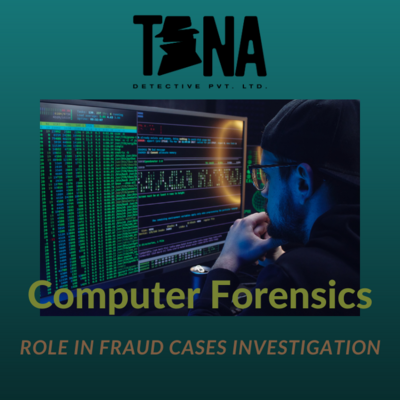Computer forensics plays a critical role in investigating and solving fraud cases investigation. With the increased reliance on technology in our daily lives, including the use of computers and the internet, fraudsters have found new ways to commit fraud. These types of fraud are often sophisticated and difficult to detect. Therefore, the need for computer forensics has become increasingly important.
Detective agencies, particularly private detective agencies in Kolkata, are often engaged by individuals and organizations to investigate fraud cases. They may work closely with law enforcement agencies or operate independently. These agencies use a variety of methods to investigate fraud, including computer forensics.
Computer forensics involves the acquisition, analysis, and preservation of electronic data. This type of forensic investigation involves the collection of evidence from electronic devices, such as computers, laptops, mobile phones, and other digital storage media. It is used to gather evidence related to a fraud case, including the identification of the perpetrator, the nature of the fraud, and the amount of money involved.
The role of computer forensics in a fraud case is multifaceted. Here are some of the ways in which it can be used:
- Identification of evidence: Computer forensics can help identify electronic evidence related to the fraud cases investigation. This includes data such as emails, instant messages, documents, and financial records that are stored on electronic devices. These types of evidence can be analyzed and used to build a case against the perpetrator.
- Reconstruction of events: Computer forensics can also help reconstruct events leading up to the fraud. This includes identifying the methods used by the fraudster to commit the crime, such as the use of malware, hacking, or social engineering techniques. This information can be used to identify vulnerabilities in an organization’s security systems and prevent similar fraud from occurring in the future.
- Recovery of lost data: In some cases, important data related to the fraud may have been deleted or lost. Computer forensics can help recover this data, which can be crucial to the investigation.
- Expert testimony: Computer forensics experts can provide expert testimony in court. They can explain complex technical concepts to a jury and present evidence in a way that is easy to understand. This can be particularly important in cases where the evidence is primarily electronic.
Private detective agencies in Kolkata, including the best detective agency in Kolkata, employ computer forensics experts to investigate fraud cases. These experts use specialized software and techniques to analyze electronic data. They work closely with other investigators and law enforcement agencies to build a comprehensive case against the fraudster.
The best investigator in Kolkata will use a variety of techniques to investigate fraud cases, including interviews, surveillance, and the collection of physical evidence. However, computer forensics has become an essential tool in the fight against fraud. It allows investigators to uncover electronic evidence that may not be readily visible, and to use that evidence to build a strong case against the perpetrator.
When choosing a detective agency in Kolkata, it is important to select a reputable agency that has experience in investigating fraud cases. Look for an agency that employs computer forensics experts and has a proven track record of success in investigating fraud. The agency should be able to provide references and testimonials from satisfied clients.
In conclusion, computer forensics plays a critical role in investigating and solving fraud cases investigation. Detective agencies, particularly private detective agencies in Kolkata, use computer forensics to identify evidence, reconstruct events, recover lost data, and provide expert testimony in court. When choosing a detective agency, it is important to select one that has experience in investigating fraud cases investigation and employs computer forensics experts.

